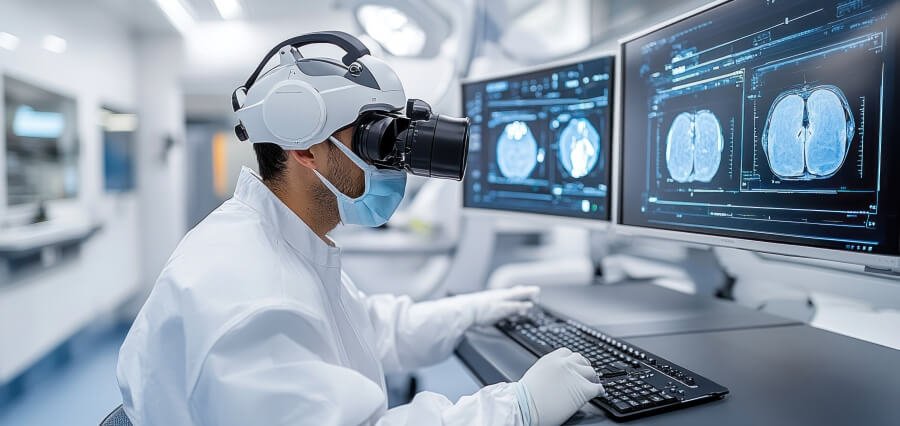Telemedicine innovation revolutionized the medical and healthcare industry into a telemedicine innovation for medical intervention and consultation to new dimensions. Telemedicine innovations, with digital health technologies, augmented patient outcomes immensely, reduced medical expense, and harmonized medical caregivers with patients worldwide globally. Artificial intelligence and home care for patients acquiring popular usage through telehealth solutions, telemedicine innovation molds the contemporary medical care to new dimensions.
The Evolution of Advancements in Telemedicine
Telemedicine has transformed from being an online portal for consultation to a complete healthcare solution. Telemedicine was previously limited to rural consultations without the support of health infrastructure. Telemedicine is now the complete subset of the healthcare process with high-speed internet, mobile apps, and cloud computing. Specialists are consulted, medication is prescribed, and chronic illness is managed from home by the patients.
Future of Telemedicine: Implementation of AI and Machine Learning
The most common telemedicine technology is AI and machine learning use. Both improve diagnostic accuracy, disease prediction, and personalized treatment plans. AI chatbots assist patients in interrogation, appointment booking, and preliminary medical consultation. Machine learning tools categorize vast patient databases to detect patterns and offer predictive information, maximizing telemedicine delivery efficiency.
Wearable technology and home patient monitoring
Remote patient monitoring (RPM) has accelerated with the widespread adoption of wearable technology. Wearable fitness monitors, smartwatches, and medical-grade sensors transmit real-time vital signs such as heart rate, blood pressure, and oxygen saturation. They are remotely monitored by physicians who develop evidence-based treatment plans. RPM has best worked in chronic disease management like diabetes, hypertension, and cardiovascular disease, hospital readmission reduced, and patients empowered.
Telemedicine Milestones in the Treatment of Mental Illness
Mental illness treatment has been transformed by telemedicine technology. Virtual therapy, online counseling, and artificially intelligent-based mental illness apps all empower individuals afflicted with mental illness. Patient compliance has been made easy and accessible with the ability to view a therapist anywhere with mental illness professionals. CBT apps and artificially intelligent-based mental illness screening tests also improve telepsychiatry treatment effectiveness.
Blockchain and Telemedicine Data Security
The most important aspect of telemedicine is data privacy. Blockchain offers a secure and unbreakable way of handling electronic health records (EHRs). Decentralized storage and encryption will never let patients’ information land in the wrong hands and stay safe. Blockchain offers interoperability among healthcare providers in a way that medical reports are delivered without compromising data integrity and patient confidentiality. All such telemedicine technologies must ensure and safeguard.
Virtual Reality and Augmented Reality in Telemedicine
Virtual reality (VR) and augmented reality (AR) are transforming telemedicine by way of remote surgical mentorship and virtual medical simulation. Virtual reality simulation enables students to practice complicated procedures virtually. Augmented reality assists surgeons by superimposing vital patient information onto the operating area while an operation is being performed, increasing precision and reducing surgery errors. Telemedicine platforms virtual reality and augmented reality created new means for remote learning and medicine. Telemedicine technologies are being equated to improved health results and greater efficiency. The Impact of 5G on Telemedicine
Implementation of 5G in the networks opened telemedicine doors long enough to masses. 5G brought about real-time high-definition video calls, robot surgeries conducted remotely, and twenty-four-hour seamless interconnectivity of IoT devices within lower latency and faster delivery of data. The network stability increases, and now it becomes possible for rural and remote societies for the convenience and accessibility of telehealth service. Telemedicine completely relies on 5G technology adaptation.
Regulatory Issues and Ethical Issues
There are regulatory and ethical issues even with all the progress with telemedicine.
Policies on licensing and reimbursement are location-specific, and it impacts the delivery of telehealth services to the masses. Adherence to healthcare standards such as HIPAA (Health Insurance Portability and Accountability Act) and GDPR (General Data Protection Regulation) is required in collecting the patient’s information. Apart from that, ethical concerns of AI diagnosis and risk of diagnosis error must be addressed in a way that patients’ confidence will be able to continue to avail itself on telemedicine services. Technical innovation in telemedicine must always be followed by regulation in order to take the role of guarding the patients and enlightening the patients. Future of Telemedicine
Future of telemedicine is optimistic with continuing technical innovation.
Artificial intelligence-driven diagnostic equipment, advanced robots, and advanced virtual consultations will be the standard of healthcare delivery. Electronic health records, blockchain’s advanced use as a verifier of legal information, and global deployment of 5G will make telemedicine a part of daily life healthcare delivery. Healthcare professionals and governments need to come together and implement standardized protocols and offer telemedicine to all the world’s citizens. Telemedicine will keep revolutionizing the healthcare industry.
Conclusion
Telemedicine technology has revolutionized the delivery of health care in ways that have rendered it more accessible, affordable, and effective.
With telemedicine technology providing AI-driven diagnosis, remote monitoring of patients, and virtual psychiatric services, the health care industry is changing increasingly. Telemedicine technology will keep reshaping the provision of health care to the world and improving patient care as technology evolves. As long as there are proper systems of governance and ethics, the future of telemedicine technology promises a healthier world.
Read More – Click Here





